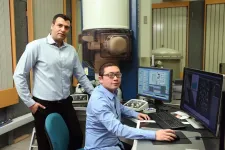The research, 'Effects of the COVID-19 pandemic on primary care-recorded mental illness and self-harm episodes in the UK: a population-based cohort study', was conducted by the National Institute for Health Research Greater Manchester Patient Safety Translational Research Centre (NIHR GM PSTRC). The Centre is a partnership between The University of Manchester and Salford Royal NHS Foundation Trust. The research was jointly funded by the NIHR and UK Research and Innovation as part of their COVID-19 Rapid Response Initiative.
The research looked for the first time people sought help for their mental health and this could be at their general practice or at a hospital A&E department. Researchers discovered that during the first full month of the UK wide lockdown, in April 2020, the number of incidents of depression recorded in general practice records dropped by 43%, anxiety disorders by 47.8% and prescribing of antidepressants also dropped significantly, by 36.4%.
Dr Matthew Carr from The University of Manchester, and lead for this study at the GM PSTRC, said: "It is widely believed that there was an increase in the number of people with symptoms of mental illness in April due to the extra pressures from the lockdown. However, our research has revealed a sharp reduction in recorded illness diagnoses and self-harm episodes. By September 2020 our data shows that these frequencies had returned to near normal in England."
As well as identifying the general trend of people not seeking help during April 2020, the research also uncovered significant treatment gaps. This was greatest for people of working age and those registered at general practices in more deprived areas where the reduction in diagnoses coded was greatest.
Dr Carr, continued: "This research is so important because it shows the scale of the drop in the number of people seeking help, and, crucially, the treatment gaps"
Another important finding reveals the number of people presenting with self-harm was 37.6% lower than expected in April and the reduction was greatest for females and those aged under 45.
Dr Sarah Steeg, Presidential Fellow in mental health epidemiology at The University of Manchester jointly led the research, and said: "It is understandable that people didn't seek help at the height of the pandemic in the spring of 2020. However, GPs moved quickly to offer remote consultations for many appointments. The consequences of patients not receiving help when they need it could result in further struggles for those individuals, and therefore they must be encouraged to seek support if they are worried about their mental health
"This research has shown how addressing delays in diagnosis and treatment for mental illness and self-harm requires prioritisation, particularly for the groups of people we've identified as experiencing the biggest treatment gaps. As we manage ongoing fluctuations in COVID-19 rates, we hope our research findings can be used to inform public health messaging targeted at specific groups of patients which will help to improve patient safety in the near future."
Professor Carolyn Chew-Graham, a GP in Manchester and Professor of General Practice Research at Keele University, and part of the research team, said: "This research mirrors my clinical experience. Consultation rates reduced in April and May, with people following the 'Save the NHS' message. Since the early summer we have noticed increasing demand and, particularly, increasing distress in patients.
"The impact of this work for primary care is that we need to make it as easy as possible for people who are distressed to consult their GP, but balance this with the need to keep footfall as low as possible in the practice, in accordance with NHSE guidance and COVID-19 restrictions. Primary care clinicians need to ensure that when consulting patients remotely, they offer time, empathy and understanding and facilitate people to disclose their concerns, which both parties might find more difficult in telephone or video consultations. Managing risk and dealing with uncertainty are now even more important for primary care clinicians."
Nav Kapur, Professor of Psychiatry at The University of Manchester and lead for the Mental Health Research programme at the GM PSTRC, said: "For me this paper tells one of the big and perhaps forgotten stories of the pandemic - the fall in health care use for mental health problems during the early part of lockdown. This is particularly important because we know from other work that, on average, population mental health got worse after March compared to pre-pandemic levels. "It's so important that we continue to carefully monitor the mental health effects of COVID-19 and I'm pleased that the NIHR Greater Manchester Patient Safety Translational Research Centre continues to make this kind of cross disciplinary collaboration possible." Lucy Schonegevel, Deputy Campaigns & Policy Associate Director for Rethink Mental Illness said:
"GPs are often the first port of call for people struggling with their mental health, so it's concerning to see a significant drop in appointments during the first lockdown. There's a worrying disconnect here, as we saw demand for advice and information on our website double in the six months after lockdown was first introduced, in particular, there was an increase in the number of people seeking advice about self-harm.
"It's crucial that the NHS continues to promote the message that it is open for business, despite the pressures of COVID-19, and that this message reaches everyone in need of support. Mental health is just as important as physical health and people should be encouraged to contact their GP as soon as possible to discuss any concerns. The effects of the pandemic on people's mental health may be felt for years to come, so it's crucial that everyone can access the right treatment at the right time through their GP."
Professor Dame Til Wykes, Senior NIHR Mental Health Researcher, said: "As this research makes clear, now is not the time to suffer in silence. More than ever, people experiencing depression, anxiety and other mental health issues should seek the help they need from the health service, and family and friends.
"NIHR have recognised the challenges that mental health issues have posed during COVID-19 so have funded this project with UKRI as well as other research to investigate and reduce the impact of the COVID-19 pandemic on mental health."
INFORMATION:
Media enquiries:
Mary Vingoe - Communications Manager
Email: mary.vingoe@srft.nhs.uk
Mobile: 0773 8880152
Notes for editors:
* http://www.thelancet.com/journals/lanpub/article/PIIS2468-2667(20)30288-7/fulltext - live after 23:30 11 January 2021 (GMT)
About the NIHR Greater Manchester Translational Research Centre: The NIHR Greater Manchester Patient Safety Translational Research Centre is a partnership between The University of Manchester and Salford Royal NHS Foundation Trust in collaboration with The University of Nottingham which aims to make healthcare safer in primary care and transitions of care. It's funded by the National Institute for Health Research (NIHR) for five years from 2017 until 2022 and is one of three PSTRC in England. The GM PSTRC is responsible for research across four themes: Safety Informatics, Medication Safety, Safer Care Systems and Transitions, and Safety in Marginalised Groups.
For more information visit - http://www.patientsafety.manchester.ac.uk/
About the University of Manchester: The University of Manchester, a member of the prestigious Russell Group, is the UK's largest single-site university with 38,600 students. It has 20 academic schools and hundreds of specialist research groups undertaking pioneering, multi-disciplinary teaching and research of worldwide significance. The University is one of the country's major research institutions, rated fifth in the UK in terms of 'research power' (REF 2014), and has had no fewer than 25 Nobel laureates either work or study there. The University had an annual income of £1 billion in 2014/15. Visit http://www.manchester.ac.uk
ABOUT THE NIHR: The National Institute for Health Research (NIHR) is the nation's largest funder of health and care research. The NIHR: END


